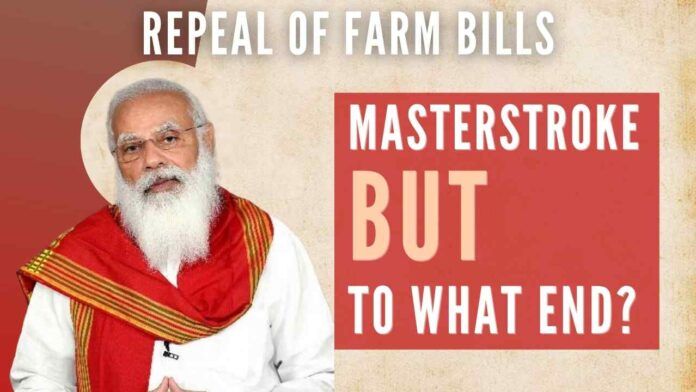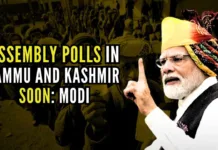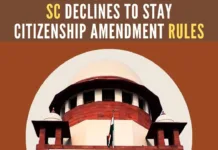
Why did Modi repeal the farm bills?
Why would an astute, bold, committed, and determined Modi announce to repeal the farm bills on the Gurupurab festival, the birthday of Sikhism founder Guru Nanak? He reminded the nation, ‘Vich Duniya Sev Kamaiye, Taan Dargah Baisan Paiyeea,’.which means, ‘by taking the path of service to the nation can life turn out well.’ Modi said that his government has been working sincerely with this sense of service to make people’s lives easy. He apologetically said that since some section of farmers could not be persuaded about the benefits of these bills, these are being repealed in the best interest of the nation. It takes a big heart to undo what was done very thoughtfully and voted by the Parliament.
I am afraid that those calling Modi’s decision cowardice and calling him a loser will soon realize that India’s best strategist and the undeterred leader have much bigger reasons related to national security and integrity. If anything, Modi’s masterstroke deserves accolade and appreciation for being apologetic and compassionate about his decision. Any comparison between Modi’s magnanimity as the leader and the so-called farmer leaders leading the protests is foolhardy. Thus, there is no question of Modi losing and farmers winning; it is India who must always win.
I am appalled that the cheering farmers’ leaders were dancing and distributing sweets, celebrating, and claiming victory. The opposition parties are in the frenzy adding fuel to the fire because Modi’s masterstroke took away their thunder of making farmer protests an issue in the upcoming Assembly elections in the northern states of U.P., Punjab, Uttarakhand, and Haryana. If the protests had continued, I could foresee the potential for escalation of communal violence similar to what happened in Lakhimpur in the U.P. just last month. Modi’s strategic decision will silence the political rivals from inciting violence on the shoulders of poor farmers. We can all speculate and debate on why, what, and who was behind the strategy of repealing the farm bills, however, the truth and the whole truth is only known to Modi and some of his close confidants.
Based on my reading and analysis, I sense a deeper connection between the very auspicious Gurupurab and the repeal of the farm bills on that day. While multiple conspiracies may be brewing, Modi and his team realized the cumulative gravity of the situation, particularly, in Punjab, the breadbasket of India and home to the largest number of Sikhs. They are well known for their valor, service to humanity, and making huge sacrifices in defending India’s honor and territorial integrity. Both, the Sikhs and Hindus believe in the tenets of Sanatan Dharma and have lived together under one flag for ages and thus imagine the unimaginable of distancing them apart.
Not surprisingly, however, there is a group among Sikhs who have been misled for seeking a separate Khalistan state since Indira Gandhi was the Prime Minister. The break-India movement by Khalistan believers is squarely aided by Pakistan to avenge Bangladesh’s separation during her time. The movement is also funded by Khalistan-Sikh groups settled overseas (U.K., U.S.A., Canada, and Australia, etc.) with Canada being on the forefront. Additionally, the break-India movement also aided and supported by anti-Modi, anti-India groups in the West, the opposition parties in India who fear extinction in the electoral polls, and Muslims who never made peace with the enactment of CAA, NRC, removal of Article 370, and Triple Talaq, etc. in the national interest.
In my analysis, the repeal of farm bills was needed and announced because India is faced with a formidable possibility of attacks on both fronts: the LAC of China and the LOC of Pakistan. It appears that Pakistan has intensified the incidences of violent attacks and terrorist activities in Kashmir and the frequency of drones from across the border in Punjab. It is feared that China is funding ISI for Khalistan, the Chinese army and fighter jets are on the move on the border, and China is asking her people to store food.
Some of this sensitive and critical information about Punjab is likely revealed by the former Chief Minister, Captain Amarinder Singh, who broke away from Congress and met the Home Minister. Reportedly, he was the “happiest man” calling Modi’s announcement a “divine intervention.” He was perhaps aware of internal security threats by Sikhs of Khalistan-camp which nobody else would have known. His discussions with and disclosures to Amit Shah must have been very convincing for Shah to make a strong and persuasive argument to Modi for the repeal of bills. Thus, Modi’s unexpected announcement on Gurupurab is, first and foremost, to preserve Hindu-Sikh unity, recognize the valor and bravery of the Sikh regiment for India’s defence, and honor the Punjab farmers.
The irony is that even after the well-intended withdrawal of the farm bills, the union leaders want farmers to mark the first anniversary of the agitation against the farm laws on November 26 with tractor rallies across state capitals. It is worth noting that 26/11 is also the day of the Mumbai attacks by Pakistani terrorists. Reportedly, they also plan to send 500 farmers in tractors every day to Parliament to protest starting November 29. Don’t they trust Modi’s words, deeds, and what he has accomplished for India in his seven years as the leader?
On a personal level, I know many Sikh families who migrated to U.P. near my native village, purchased land, and worked hard to earn well-to-do status compared with the longtime resident farmers. In fact, Lakhimpur became the hot spot because of the possible rivalry between the well-to-do Sikh farmers, supported by the opposition parties, and a local political family belonging to BJP. It was an incendiary incident killing 8 people and still remains under investigation.
With possible external threats looming large and at-risk internal security, Modi announced the repeal of the bills and asked the protestors to go home. It is no small coincidence that the U.S. State Department issued a travel advisory asking citizens to not travel in certain areas of India due to China and Pak threats of attack. On the home front, there has been heightened movement of BSF and increased deployment of the military to sensitive areas. The opening of the historic Kartarpur Sahib (in Pakistan) for India’s Sikhs’ pilgrimage may be another ploy to appease the Sikhs and target the more vulnerable Sikhs to stand up against India for a separate Sikh land. Apparently, the controversial former cricketer and now Punjab Congress Chief, Navjot Singh Sindhu, called Pakistan’s Imran Khan his older brother during his pilgrimage[1].
Modi’s decision of repealing the farm bills is an important chapter in India’s political history. While I stand behind his decision and give him credit for listening to people’s voices in upholding people’s democracy, I wonder to what end? The so-called farmer leaders are already threatening not to return home and putting more demands on the table. They want guaranteed MSP, withdrawal of legal cases against farmers who allegedly violated law and order, compensation to the families who died during the protests, and a memorial for them. While their demands may have justification, their refusal to return home is clearly a sign of dishonoring their own promise and disrespecting Modi’s sincere efforts in the best interest of the country. Another equally unfortunate emerging news is that anti-India elements are already talking about people’s protests against CAA, NRC, and Article 370, etc. One can only hope that Modi’s decision does not become a precedence for others to engage in public protests to pressure the government to withdraw the earlier laws.
Generally, the elections are accompanied by political rhetoric anywhere but India, in the past, has witnessed political rallies turning into violence and communal tensions. It is my belief that Modi’s decision to repeal the farm bills is to restore India’s unity against external threats and contain internal communal strife. If the opposition parties, anti-India elements anywhere, and/ or the protestors do anything different, it will only weaken India’s democracy. All I can hope for is that wisdom prevails for India’s unity against any external threats and the vigilant law and order personnel work against the potential for violence and anarchy until the elections are over.
Note:
1. Text in Blue points to additional data on the topic.
2. The views expressed here are those of the author and do not necessarily represent or reflect the views of PGurus.
References:
[1] Navjot Singh Sidhu Says ‘Imran Khan Is My Elder Brother, Gave Me Lot Of Love’ In Kartarpur – Nov 20, 2021, ABP Live
PGurus is now on Telegram. Click here to join our channel and stay updated with all the latest news and views
For all the latest updates, download PGurus App.
- Education and election in Bharat: Race to the top - April 16, 2024
- Kejriwal: “An Insignificant Man” or a corrupt politician with impending prison term - March 24, 2024
- Bharat’s general elections and the Model Code of Conduct - March 22, 2024










